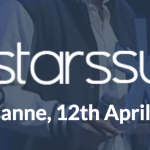A team from TechCrunch comprising of directors of Startup Battlefield led by Jake Bright and Samantha Stein paid a visit to Co-Creation Hub in Yaba, Lagos. The team announced the time when Startup Battlefield will host its next edition. The edition brings together the best startups in their early stages globally to compete for the Disrupt Cup that is worth $50,000. Furthermore, they get a chance to have the investors and media attention at no cost.
Startup Battlefield toured Africa for the first time in 2017. During that time 15 startups were shortlisted to take part in the event. Nigeria was represented by Delivery Science and Form+. Kenyan based Lori startup won the award at an event hosted in Nairobi, Kenya in October 2017. The logistic startup took home $25,000 equity-free funding. A trip for two was organized and paid for to take part in the Startup Battlefield competition at Disrupt SF 208 the TechCrunch’s flagship forum. The competition’s new date is yet to be announced. But the audience in Lagos got the chance to learn more about criteria used to select the startups and the qualifications needed.
Here are the qualifications for startups to take part in the Startup Battlefield
- The startup must be at its early stage with either prototype or MVP
Entrepreneurs only qualify for the competition if their startup has a prototype or a minimum viable product. Those with ideas without a tangible product to pitch are not legible to take part. It is not necessary that the MVP should be perfect but at least it must be functional.
- The startup can either be tech-enabled or tech-focused
A startup does not need to sell tech products or offer tech services to qualify. A startup that its processes or operations are built on strong technology stands a chance to qualify. For instance Form+ and Konga startups are tech-enabled.
- The startup must be best suited for the market and works in line with the current technology trends
This is the main criteria used amongst them all. According to Samantha Stein, the judges in most cases do pick startups that are able to succeed. Relevance and market fit are the two main determinants of the success of any startup. The startup must be in a position to tackle challenges in their market of operation. However, their services and products must be able to reflect market trends. Nich-especially e-commerce startups are more useful now than the general ones. AgriTech startups and those using blockchain are also relevant currently.



